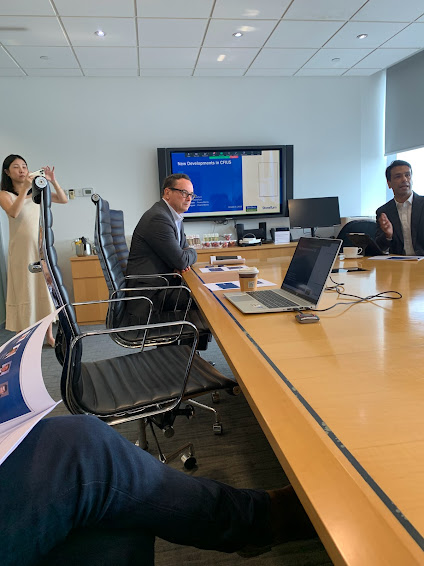I remember in one of my many discussions over beer
with the Old Rogue, he would often state that America started having issues
when it implemented a “welfare system.” He argued that the problem with the welfare
system was the fact it was not designed to help the poor but to create jobs for
“useless” people who would be incentivized to keep the poor that way so that
they would always have a job.
OK, I get that his comments aren’t politically
correct. However, I believe that he has a point. The next time you need to swim
through paper work in an office, ask yourself if that paper work actually leads
to anything productive or if it’s designed to create work for the sake of
creating work. You need to ask yourself who benefits from this. Inevitably, you’ll
find that “work process” aren’t actually processes to get a job completed but a
means of keeping parasites busy.
This became very apparent when I attended a talk at a
law firm on “Committee on
Foreign Investment in the United States” (“CFIUS”). The talk was moderated by a
friend and former customer at the Bistrot. One of the main speakers was an
American lawyer who dialled in from one of the American offices and the other
was from a consultancy. The later had actually worked at the Department of
Justice and Homeland Affairs and had played an active role in making CFIUS what
it is.
Now, I get that
the world cannot be totally open. Just as a lot of good things came about when
countries opened up, a lot of bad things also crossed borders. In an ideal
situation most, places should be open enough for goods and services to cross borders
but closed enough so that nasty things like terrorist and crooks stay out.
I get that in
the case of America, there are genuine concerns about national security, where
you don’t want potential adversaries getting hold of sensitive military
information. So, in world where Russia is openly aggressive and China is increasingly
more assertive, it is understandable that the USA would want a certain amount
of control over what goes on in its borders. So, I get that there is a
rationale behind CFIUS and I can understand why other countries are following
the American example and implementing CFIUS.
However, while
I do get the need for controls on certain things, we have to ask ourselves if
we are creating a situation where the people you are creating complications for
the sake of creating complications so that lawyers and consultants can stay in
a job rather than achieving an objective.
The speaker made
the point that certain definitions were kept vague so that CFIUS could come down
on businesses and it made negotiations all the more interesting. The speaker
gave an example of a French company that he once worked for that bought an
American subsidiary in a “sensitive” industry. In order to get the deal
approved by CFIUS, the French parent company had to agree that only natural
born US citizens could work in the American subsidiary (everyone from the CEO
to the janitor). As the speaker stated, this violated a bunch of American laws
but the issue of “national security” overrode enabled these laws to be
overridden. This is despite the fact that there is “NO PROOF” that naturalised
citizens are less loyal than native born citizens (let’s remember that the 2005
London Bombers were native born).
This is,
unfortunately not the only example of governments trying to keep lawyers and
consultants in a job. I recently had to fill out the American ESTA form. Now, the
last time I filled out the ESTA was a decade ago when I went to the USA to see
my stepdad for his 80th birthday. That experience was painless. This
time, it wasn’t. They went as far as to ask me for my various social media
accounts. Erm, what was that supposed to achieve other than to give someone who
had never done a day of honest work a sense of superiority?
To be fair to
the Americans, they aren’t the only nation where governments feel obliged to
create problems for productive people, I think of Singapore where we insist on
looking for useless information about people – just think of the way the
government needs to know which primary school you went to and what your Primary
School Leavers Exam (PSLE) results were, whenever you apply for a government
job. Who exactly does this benefit except some worm sitting in an office?
Yes, I do get
that you can throw things wide open. However, we need to stop creating useless
work for useless people and encourage them to be productive rather than
parasitic. Society can only progress if its citizens are used for work that
benefits people rather than paper pushers and worms in cubicles.

No comments
Post a Comment